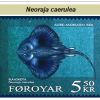Wpisy: 35
Język: English
Nile (Pokaż profil) 19 października 2013, 14:29:02
I think this is mostly confusing because of how "goodly" isn't very common as an adverbial form of "good", with "well" preferred, yet "well" is also an adjective.
RiotNrrd (Pokaż profil) 19 października 2013, 15:06:48
sudanglo:... there is something odd about li estas bone.Well, I imagine if li ne estas bone, he'd probably just pop out of existence.
RiotNrrd (Pokaż profil) 19 października 2013, 15:18:32
Nile:"Estas bone" seems to me like "does a good job at being/existing/having particular qualities".Estas bone, meaning It's good, works as a full sentence, but the adverb needs to go if you add a noun.
In Esperanto, unless there's an implied noun, adjectives cannot stand alone; they always need a noun to hang off of. Adverbs, however, don't require (or modify, for that matter) nouns*. In the full sentence Estas bone, there is no explicit or implied noun (in English the implied noun would be "it", but Esperanto dispenses with that sort of construction), so there can be no adjective; the bon- word must be an adverb (also, the only other word in the sentence is a verb, and that is what adverbs modify).
If you add a noun or pronoun, however, as in Li estas bone, then an adjective (bona, here) is the correct choice to describe qualities, etc., of li because you aren't really talking about the verb.
Some people see this odd transformation of adjectives into adverbs when you remove the noun as a flaw of Esperanto. Honestly, though, it works just fine. I've never seen a case where it confused anybody.
Don't equate the Esperanto -e suffix with the English -ly suffix, except as a kind of mental shortcut for deciding meaning. They are similar, but they are not quite the same. This difference in function will cause you to see Esperanto adverbs in places that don't - or only barely - make sense in English.
--------------------
* They don't require verbs either; in Esperanto, adverbs can stand alone (this is most strongly seen in the -ante constructions which sometimes start sentences). For this reason, Esperanto tends to be a bit more heavily adverbial than English. So the full, single word sentence Bona is grammatically incorrect, whereas the full sentence Bone is fine.
Ganove (Pokaż profil) 19 października 2013, 19:45:00
Kirilo81:whysea:But how about "Kiel vi estas?"Then the response should be "Mi estas bone", which of course is grammatically incorrect.
Duko's "Kiel vi?" as shortcut for "Kiel vi fartas?" is a viable option.
Tempodivalse:Even the English phrase "I am good." is grammatically wrong in that case, since it is an abbreviation for "I am doing good." and you cannot describe the predicate "am doing" with an adjetive. This is just colloquial English. So, grammatically correctly, it should be "I am doing well."erinja:Kiel estas vi? doesn't work grammatically.How is "kiel estas vi?/kiel vi estas?" ungrammatical? I see it used quite often. It has direct equivalents in many languages: Spanish "¿Cómo está usted?", English "How are you?"
"Kiel vi sentiĝas" doesn't really work and comes across almost asking if the person is sick. "fartadas" doesn't really avoid the issue at all.
But I suppose if you are willing to speak crippled, strange Esperanto, simply in order to avoid a certain word that sounds a little funny, then you are hurting only yourself, by using your crippled/strange Esperanto.
I see a different meaning in "I am good." campared with "I am well."
I would expect a class what you are actually good at, like "I am good at maths." I guess the latter one doesn't imply that I feel good just in maths class.
But you cannot say "Mi estas bone." in Esperanto. And "Mi estas faranta bone." sounds really weird to me.
Coming back to the original question, I thing "farti" is the best word for describing your state of health in Esperanto.
kaŝperanto (Pokaż profil) 21 października 2013, 21:23:23
Moosader:It seems like you should have no trouble finding male komencontoj with such enlightening subjects. We talk about these things all the time.
It's just hard to convince other people to learn Esperanto with me when I'm always talking about farting, boners, and shat.
I mean that both lightheartedly and seriously; maybe I should save "how are you?" "I'm doing well" and "I like ____" for later on.

RiotNrrd:lol, kind of like replacing "estas" with "ekzistas".sudanglo:... there is something odd about li estas bone.Well, I imagine if li ne estas bone, he'd probably just pop out of existence.
---
What about asking about someones current quantity of good-ness:
"Kiom da boneco havas vi?"
"Mi havas multe da boneco, kaj vi?"
It's a stretch, and why you wouldn't want to have a legitimate reason to say 'fart' is beyond me.




